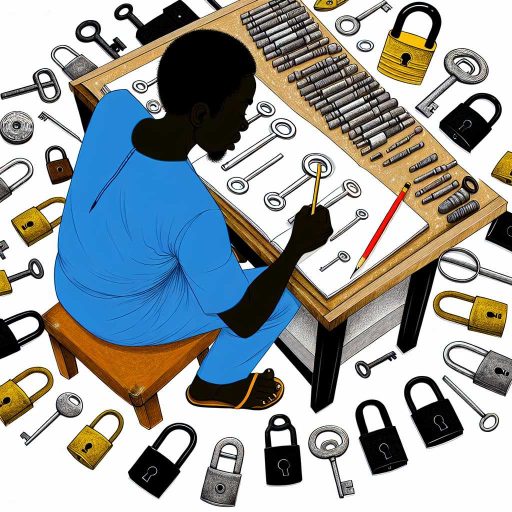Introduction
The plumbing profession in Nigeria plays a crucial role in maintaining infrastructure.
It ensures safe water supply and adequate waste disposal.
Plumbers install, repair, and maintain systems that enable these essential functions.
Plumbing is vital in both residential and commercial sectors.
In homes, plumbers ensure that households have access to clean water.
They also address problems like leaks and blockages to maintain hygiene and safety.
In commercial settings, plumbers install complex systems in offices, schools, and hospitals.
They manage larger networks, ensuring that these spaces meet health and safety standards.
Consequently, proper plumbing directly enhances public health and comfort.
Aspiring plumbers in Nigeria can explore numerous opportunities.
As urbanization continues, the demand for plumbing services grows significantly.
New housing developments, factories, and commercial complexes require skilled plumbers for installation and maintenance.
Moreover, career advancement is possible through specialization.
Areas like industrial plumbing, drainage, and renewable energy systems offer unique prospects.
Professional plumbing certifications can further enhance a plumber’s career and credibility.
Many plumbers start as apprentices, gaining practical experience under experienced professionals.
This hands-on training is invaluable in understanding plumbing systems effectively.
After completing an apprenticeship, plumbers can pursue their own projects or join established companies.
Networking is essential in the plumbing industry.
Attending industry events and joining professional organizations can provide valuable contacts and resources.
By building a reputation for reliability, plumbers can attract more clients and secure referrals.
In fact, plumbing is a rewarding career in Nigeria.
It offers numerous opportunities for skill development and career growth.
With dedication and proper training, aspiring plumbers can build successful careers while contributing positively to society.
Understanding the Role of a Plumber
Plumbing plays a vital role in modern society.
It encompasses the system of pipes, fixtures, and fittings used for the distribution of water.
Plumbing also involves the removal of wastewater and sewage.
In Nigeria, plumbing is essential for households, businesses, and industries.
Definition and Scope of Plumbing
Plumbing refers to the entire system of water supply, distribution, and waste drainage.
Plumbers install, maintain, and repair plumbing systems.
They work with a variety of materials such as pipes, valves, faucets, and fixtures.
Plumbing involves using both basic skills and specialized knowledge.
The scope of plumbing isn’t limited to just fixing leaks.
It also includes:
- Installing piping for potable water.
- Setting up drainage systems for wastewater.
- Repairing and replacing fixtures like sinks and toilets.
- Inspecting plumbing systems for leaks and issues.
- Advising clients on plumbing upgrades and maintenance.
Different Types of Plumbing Services
Plumbers can specialize in different segments of the industry.
They provide various services depending on their area of expertise.
The three primary types of plumbing services include:
- Residential Plumbing: This includes the plumbing of private homes.
Residential plumbers handle installations, repairs, and emergencies in domestic settings. - Commercial Plumbing: This type involves larger-scale plumbing services for businesses.
Commercial plumbers work in offices, schools, hospitals, and other commercial establishments. - Industrial Plumbing: Industrial plumbers focus on complex plumbing systems in factories and large facilities.
They manage high-capacity piping, waste disposal, and hazardous waste systems.
The Day-to-Day Tasks and Responsibilities of a Plumber
A plumber’s day-to-day responsibilities vary depending on their specialization, but generally include:
- Assessing Plumbing Systems: Plumbers evaluate systems to identify issues.
They use diagnostic tools to pinpoint problems. - Installing Pipes and Fixtures: Plumbers install new systems and fixtures.
Their work ensures proper water flow and drainage. - Repairing Leaks: Plumbers locate leaks and apply repairs.
They use seals, soldering, and other methods to fix problems. - Maintaining Systems: Regular maintenance is crucial.
Plumbers perform routine inspections to prevent issues. - Reading Blueprints: Plumbers read technical drawings.
This understanding allows them to implement complex installations. - Advising Clients: Plumbers provide consultations.
They help clients choose appropriate systems and fixtures based on needs. - Keeping Up with Codes: Plumbing regulations ensure safety and efficiency.
Plumbers must stay updated on local codes and standards.
In short, understanding the role of a plumber is essential for those aspiring to build a career in plumbing.
The field offers diverse opportunities.
With the right skills and knowledge, you can excel as a professional plumber in Nigeria.
Required Skills and Qualifications
To build a successful career as a professional plumber in Nigeria, certain skills and qualifications are essential.
Plumbing is a technical field that requires not only practical skills but also theoretical knowledge.
Here’s a breakdown of the necessary skills and educational requirements.
Essential Skills Needed for Plumbing
- Technical Skills: Plumbers must understand various plumbing systems.
They should be able to install, repair, and maintain pipelines.
Knowledge of tools and equipment is crucial for performing tasks efficiently. - Analytical Skills: Plumbers frequently diagnose issues in plumbing systems.
They must analyze problems and develop effective solutions.
This skill prevents unnecessary repairs and saves time. - Problem-Solving Skills: Effective problem-solving is vital in plumbing.
Plumbers encounter a wide range of issues.
Quick thinking and creativity help address these challenges efficiently. - Attention to Detail: Plumbers must pay close attention to details.
A small oversight can lead to significant plumbing issues.
Being meticulous reduces the risk of future problems. - Physical Stamina: Plumbing often involves physical labor.
Plumbers need good strength and endurance to lift heavy materials.
They must also work in tight spaces and various positions. - Communication Skills: Plumbers work with clients, suppliers, and other professionals.
Clear communication ensures that projects run smoothly.
Strong interpersonal skills also enhance customer relationships.
Educational Requirements
Education plays a vital role in developing a successful plumbing career.
While formal education varies, certain requirements exist.
- Secondary Education: A high school diploma or equivalent is often the foundational requirement.
Basic mathematics and physics understanding can be beneficial. - Vocational Training: Many plumbers attend vocational schools.
These programs offer hands-on training in plumbing techniques.
They cover topics like pipe installation, maintenance, and repair. - Apprenticeships: Completing an apprenticeship provides invaluable experience.
This on-the-job training allows aspiring plumbers to learn from experienced professionals.
Most apprenticeships last about 2-4 years, combining classroom instruction and practical experience. - Continuing Education: Plumbers should pursue ongoing education.
This helps them stay updated with the latest techniques and technology.
Workshops and seminars offer valuable learning opportunities.
Importance of Certifications and Licenses in Nigeria
Certifications and licenses are critical in establishing credibility as a plumber.
They demonstrate professionalism and adherence to industry standards.
- National Certification: In Nigeria, obtaining certification from relevant authorities is essential.
This includes passing exams that test plumbing knowledge and skills. - State Licenses: Many states require plumbers to have specific licenses.
These licenses vary by location. Ensuring compliance with local regulations is crucial. - Specialized Certifications: Plumbers can pursue certifications in niche areas.
These may include gas fitting or commercial plumbing.
Specialized certifications can enhance job prospects and potential earnings. - Reputation Building: Having certifications and licenses builds trust with clients.
Homeowners are more likely to hire a certified plumber.
It signifies expertise and adherence to best practices. - Legal Protection: Being licensed provides legal protection.
It safeguards plumbers against malpractice claims.
It also ensures they meet safety regulations and standards.
Basically, to build a career as a professional plumber in Nigeria, individuals must combine essential skills with relevant educational qualifications.
The journey requires dedication and a commitment to continuous improvement.
Seeking certifications and licenses further enhances credibility.
Aspiring plumbers should stay informed about industry trends and pursue ongoing education.
This dedication will pave the way for a successful and rewarding plumbing career.
Read: Mastering the Craft: How to Become a Skilled Carpenter in Nigeria
Steps to Becoming a Professional Plumber
Becoming a professional plumber in Nigeria requires dedication and the right steps.
This guide outlines the essential steps to guide you toward a successful plumbing career.
Researching and Selecting a Plumbing Training Program or Apprenticeship
Choosing the right training program is crucial.
Whether you aim for a formal education or an apprenticeship, here are key points to consider:
- Identify Accredited Institutions: Look for reputable plumbing schools or vocational training centers.
Ensure they are recognized by relevant bodies in Nigeria. - Consider Course Content: Review the curriculum offered by different programs.
A well-rounded program includes theory and practical skills. - Check Duration: Determine how long the training lasts.
Training durations can vary between a few months to several years. - Evaluate Costs: Assess tuition fees and other associated costs.
Select a program that fits your budget without compromising quality. - Seek Recommendations: Talk to current plumbers or trainees about their experiences.
Recommendations can lead you to quality programs. - Review Job Placement Assistance: Investigate if the program offers job placement services.
Strong connections with local businesses can be invaluable. - Visit the Facilities: If possible, visit the training centers to see the facilities.
A well-equipped workshop indicates a commitment to quality training.
The Significance of Hands-On Experience and On-the-Job Training
Hands-on experience is vital in plumbing.
Theoretical knowledge alone cannot prepare you for real-world challenges.
Benefits of practical experience include:
- Skill Development: Practical training helps you develop essential skills.
You learn how to use tools and diagnose plumbing issues. - Real-World Problem-Solving: Live projects offer valuable lessons.
You’ll learn to troubleshoot and resolve actual plumbing problems. - Understanding Building Codes: On-the-job training exposes you to local building codes and regulations.
Knowing these is crucial for compliance. - Work Ethic and Responsibility: Working under a mentor builds professional attitudes.
You develop a strong work ethic and accountability. - Networking Opportunities: Engaging in actual jobs helps you connect with professionals.
Networking can lead to job opportunities upon completion of training. - Enhanced Confidence: Gaining practical experience boosts your confidence.
You’ll feel more prepared to tackle plumbing challenges independently.
Guidance on Passing Certification Exams and Acquiring Licenses
Certification and licensing elevate your credibility as a plumber.
Follow these guidelines to ensure you are well-prepared:
- Understand Exam Requirements: Research the specific requirements for plumbing certification in Nigeria.
Each state may have different requirements. - Study the Material: Gather study materials related to plumbing theories and practical applications.
Consider textbooks and online resources. - Join Study Groups: Collaborate with peers preparing for the same exam.
Study groups can provide support and sharing of different perspectives. - Take Practice Exams: Complete sample questions and practice tests.
This helps you familiarize yourself with the exam format. - Seek Mentorship: Find an experienced plumber to mentor you.
Mentors can offer advice and insights on passing the exam. - Schedule the Exam: Once you feel prepared, register for the exam.
Ensure you meet all deadlines to avoid unnecessary delays. - Understand the Licensing Process: After passing, learn how to apply for your license.
Different states may have varying processes for obtaining plumbing licenses.
After acquiring the necessary training and certifications, embark on your plumbing career confidently.
Always strive to improve your skills and keep abreast of industry trends.
Continuous learning will ensure you remain competitive in this essential field.
Building a successful career as a professional plumber in Nigeria requires commitment and effort.
By researching training options, gaining hands-on experience, and obtaining the right certifications, you can establish a fulfilling career in plumbing.
Remember to stay committed to learning and growing within the profession.
With dedication and hard work, you can excel and achieve your goals.
Read: Top Trade Skills Professions Thriving in Nigeria

Finding Employment or Starting Your Own Business
Building a career as a professional plumber in Nigeria opens various exciting pathways.
After gaining the necessary skills and qualifications, the next step involves finding employment or considering entrepreneurship.
This section will guide you through job opportunities, effective resume writing, interview tips, and starting your plumbing business.
Job Opportunities in the Plumbing Industry
The plumbing industry in Nigeria offers diverse employment opportunities.
As a skilled plumber, you can explore several avenues:
- Companies: Many construction companies hire trained plumbers.
These companies often need workers for ongoing projects, including residential and commercial buildings. - Government Projects: Government initiatives frequently require plumbing services.
Contracts may arise for public buildings, schools, and health facilities. - Private Contractors: Independent contractors often seek qualified plumbers for various projects.
Networking within the community can lead to lucrative jobs. - Maintenance and Repair Services: Many businesses require plumbers for regular maintenance.
Establishing connections with local businesses can provide steady work. - Emergency Services: Offering emergency plumbing services can attract clients who need immediate assistance.
Research the local job market to identify opportunities.
Websites such as Jobberman, Ngcareers, and LinkedIn frequently list plumbing jobs.
Networking within your community also enhances job prospects.
Attend industry events or trade shows to meet potential employers.
Tips for Writing a Professional Resume
- Contact Information: Include your name, phone number, email address, and a professional social media link.
- Professional Summary: Write a brief summary that highlights your plumbing skills and experience.
Tailor this section to match the job description. - Work Experience: List previous plumbing jobs in reverse chronological order.
Focus on relevant positions and include duties and achievements. - Education and Certifications: Highlight your plumbing qualifications, certifications, and any relevant training.
Ensure these match the job requirements. - Skills: Mention specific plumbing skills and tools you excel in.
Include technical skills, problem-solving, and project management. - References: Provide references from former employers or instructors.
Ensure you have their permission and inform them beforehand.
Make the layout clear and professional.
Use bullet points for easy reading. Proofread your resume to eliminate any errors.
Tailor each resume for specific job applications, emphasizing the skills that match the role.
Acing Interviews in the Plumbing Sector
Once your resume captures attention, prepare for interviews.
Follow these strategies to excel in plumbing job interviews:
- Research the Company: Understand the company’s services and values.
Know their projects and any recent news that may be relevant. - Prepare Common Questions: Anticipate common interview questions, such as:
“What plumbing experience do you have?”
“How do you handle emergencies?”
“Can you describe a challenging plumbing project you completed?” - Show Your Skills: Bring along examples of your work or references that can vouch for your skills.
- Dress Professionally: Even though plumbing is a hands-on job, dressing neatly shows respect for the interview process.
- Ask Questions: Prepare questions to ask the employer.
Inquire about job specifics, culture, and growth opportunities. - Follow Up: After the interview, send a thank-you note or email.
Express appreciation for the opportunity to interview.
Being well-prepared gives you confidence and distinguishes you from other candidates.
Starting Your Own Plumbing Business
Starting your plumbing business can be challenging yet rewarding.
Here is a step-by-step guide to launch your own venture:
Business Planning
Begin with a detailed business plan.
Consider the following:
- Define Your Services: Clearly outline what services you want to offer.
Will you focus on residential, commercial, or both? - Market Analysis: Research your target market.
Understand the demographics, competition, and demand for plumbing services in your area. - Financial Projections: Estimate your startup costs, monthly expenses, and potential earnings.
Prepare a budget to guide your spending.
Registration
Register your business with the appropriate legal authority.
Follow these steps:
- Choose a Business Name: Select a name that reflects your brand and services.
- Legal Structure: Decide on the legal structure, such as sole proprietorship or limited liability company (LLC).
- Obtain Licenses and Permits: Research the necessary permits and licenses required in your state or local area.
Marketing Strategies
Effective marketing is essential for attracting clients.
Implement these strategies:
- Create a Website: Build a professional website that showcases your services, testimonials, and contact information.
- Social Media Presence: Utilize platforms like Facebook, Instagram, and LinkedIn to engage potential customers.
- Networking: Attend trade shows and join local business groups to meet potential clients and connect with other professionals.
- Offer Promotions: Consider introductory discounts or referral bonuses to encourage new clients to choose your services.
Starting your plumbing business requires dedication and effort.
However, proper planning and marketing can lead to success.
Therefore, exploring job opportunities and starting your plumbing business in Nigeria is achievable with the right approach.
Focus on your skills, prepare your resume, ace those interviews, and consider entrepreneurship as a rewarding path.
Building a successful career takes time, but persistence and dedication will yield positive results.
Read: Future Forecast: The Craft and Trade Skills Sector in Nigeria
The Importance of Networking in the Plumbing Industry
Networking plays a critical role in the plumbing industry, especially for those looking to establish a successful career in Nigeria.
It’s not just about what you know; it’s also about who you know.
This section explores the importance of networking, how to harness its power, and practical steps to build valuable connections.
How Networking Opens Doors
Networking can significantly enhance your job opportunities and professional relationships.
Here are several ways networking can benefit aspiring plumbers:
- Job Opportunities: Often, job openings are filled through referrals.
Having a strong network increases your chances of being considered for these positions. - Collaborations: By networking, you might find potential collaborators for joint projects.
This could lead to shared resources, skills, and increased project scopes. - Knowledge Sharing: Engaging with experienced professionals allows you to learn new techniques and skills.
This can keep you updated on industry trends and best practices. - Mentorship: A well-connected individual can guide you through challenges.
Mentors can provide invaluable advice based on their own experiences. - Increased Visibility: Attending events and engaging with others puts you in the spotlight.
You become known within the industry, increasing your chances of being hired.
Joining Professional Plumbing Associations
Being part of professional associations is one of the best ways to network.
Here are prominent plumbing associations in Nigeria:
- National Association of Plumbers and Pipefitters (NAPPP): This organization aims to improve the standards and skills of plumbing professionals.
Membership offers access to workshops and resources. - Association of Plumbing Professionals (APP): APP encourages professional development through seminars and training programs.
Joining can connect you with like-minded professionals. - Institute of Plumbing, Nigeria (IPN): This institute promotes professionalism in plumbing.
They organize events that allow networking with industry leaders and veterans.
No matter the association you choose, their resources can be invaluable.
Engage actively in these organizations.
Attend their meetings, participate in discussions, and volunteer for committees.
This will help broaden your network.
Utilizing Social Media for Networking
In today’s digital age, social media platforms play a significant role in professional networking.
Here are ways to leverage these platforms:
- LinkedIn: Create a professional profile showcasing your skills and experience.
Connect with other professionals in the plumbing industry.
Engage with their posts to build rapport. - Facebook Groups: Join plumbing-related groups on Facebook.
Participate in discussions, share your insights, and seek advice.
This can lead to valuable connections. - Instagram: Use Instagram to showcase your work and projects.
Post before and after pictures of your plumbing work.
This can attract potential employers and clients. - YouTube: Create content related to plumbing techniques or tips.
Sharing your expertise can establish you as an authority in the field.
It may also attract collaboration opportunities.
Attending Industry Events
Face-to-face networking can lead to stronger connections.
Attend industry events, trade shows, and workshops.
Here are tips for making the most of these events:
- Research Ahead: Know who will attend and what topics will be discussed.
This preparation allows you to engage meaningfully. - Prepare Your Introduction: Have a concise introduction ready.
Be clear about your skills and what you seek. - Bring Business Cards: Always carry business cards to share with new contacts.
Ensure they contain your essential contact information. - Follow Up: After the event, follow up with the people you met.
A simple message can remind them of your interaction and solidify your connection.
Creating a Personal Brand
Your personal brand can significantly impact your networking success.
Here’s how to cultivate it:
- Be Consistent: Maintain consistency across all your professional profiles.
This includes your resume, LinkedIn, and any other online presence. - Showcase Your Expertise: Share knowledge through articles or blog posts.
This establishes you as a knowledgeable professional in plumbing. - Be Professional: Always present yourself in a professional manner.
This affects how people perceive you and your capabilities. - Seek Feedback: Ask peers for feedback on your work.
Constructive criticism can help you improve and grow your professional reputation.
Networking is essential for building a successful plumbing career in Nigeria.
It helps you gain job opportunities, build collaborations, and enhance your skills.
Joining professional associations, using social media, and attending industry events are all excellent ways to expand your network.
Additionally, creating a personal brand that reflects your expertise and professionalism can set you apart.
Start connecting today, and open doors to a successful plumbing career.
Read: Craftsmanship as a Driver of Tourism in Nigeria
Challenges Faced by Plumbers in Nigeria
Becoming a successful plumber in Nigeria presents various challenges.
These obstacles can hinder career growth and professional satisfaction.
Understanding these issues helps plumbers navigate their careers effectively.
Below are some of the most common challenges plumbers face in Nigeria.
Common Obstacles in the Plumbing Profession
- Intense Competition: The plumbing industry has many skilled professionals.
Surge in the number of certified plumbers increases competition.
Establishing a unique selling proposition is crucial to stand out. - Economic Fluctuations: Nigeria’s economy can be unpredictable.
Fluctuating currency values and inflation affect consumer spending on plumbing services.
During economic downturns, customers may prioritize essential needs over repairs. - Limited Access to Quality Tools: Professional plumbing requires specialized tools.
Unfortunately, accessing these tools can prove challenging in Nigeria.
Lack of funds or availability can hinder performance quality. - Regulatory and Compliance Issues: The plumbing industry faces various regulations.
Navigating through these can be complex and time-consuming.
Compliance ensures quality and safety but demands constant awareness of updates. - Lack of Public Awareness: Many people underestimate the value of professional plumbers.
Some still prefer untrained labor for plumbing jobs.
This perception leads to lower demand for qualified professionals.
Ways to Overcome These Challenges
While these challenges pose significant barriers, plumbers can implement effective strategies.
By taking proactive measures, they can enhance their careers and business prospects.
Below are some practical solutions to these challenges.
- Continual Education: Investing in education is vital for professional development.
Plumbers should seek certifications and attend workshops regularly.
Continuous learning helps plumbers stay updated on industry trends and advancements. - Investment in Quality Tools: Quality tools improve efficiency and job performance.
Plumbers should invest in essential tools and equipment as finances allow.
Over time, this investment leads to higher quality work. - Strong Customer Relationship Management: Building solid relationships with clients fosters trust.
By engaging with customers through regular communication, plumbers can ensure repeat business.
Happy customers often provide referrals, further expanding the client base. - Diverse Service Offerings: Offering a range of services can attract more customers.
Plumbers can diversify into areas like maintenance and emergency services.
Broadening service offerings helps to mitigate income fluctuations. - Effective Marketing Strategies: Developing a solid marketing strategy enhances visibility.
Plumbers should harness digital marketing methods to reach potential customers.
Utilizing social media, websites, and local advertising increases awareness. - Networking with Other Professionals: Building connections with other industry professionals can be beneficial.
Attend seminars, workshops, and trade shows to meet peers.
Establishing a network offers support and a useful exchange of resources.
The plumbing profession in Nigeria presents unique challenges.
By recognizing these obstacles and implementing effective solutions, plumbers can thrive in their careers.
Continual education, investment in tools, and customer relationship management are key to overcoming challenges.
By staying proactive and adaptable, plumbers can build a successful career in Nigeria.
Future Trends in the Plumbing Profession
As the plumbing profession evolves, staying informed about emerging trends becomes crucial for aspiring plumbers.
This evolution depends on technological advancements, sustainability practices, and continuous education.
Here are some significant trends shaping the plumbing profession.
Emerging Technologies in Plumbing
The plumbing industry is witnessing a wave of innovative technologies.
These advancements improve efficiency, reduce costs, and enhance customer service.
Here are some notable technologies that are changing the landscape:
- Smart Plumbing Systems: These systems offer real-time monitoring of plumbing systems.
They can alert users to leaks or other issues.
Smart faucets and toilets can help conserve water. - Eco-friendly Materials: More plumbing materials are now designed with sustainability in mind.
Recycled materials are increasingly popular.
Using eco-friendly pipes and fixtures reduces environmental impact. - Innovative Tools: Advanced tools like drain cameras allow plumbers to assess problems without invasive methods.
Robotics and drones can assist in inspections, saving time and effort. - Building Information Modeling (BIM): This technology helps in designing and managing plumbing systems.
It improves collaboration among contractors and enhances project efficiency.
The Role of Sustainability in Future Plumbing Practices
Sustainability plays a vital role in shaping future plumbing practices.
Clients increasingly seek eco-friendly solutions.
Plumbers must understand how to incorporate sustainable practices into their work.
Here are some ways plumbers can adapt to sustainability demands:
- Water Conservation: Install low-flow fixtures and appliances.
Promote the use of rainwater harvesting systems. - Energy Efficiency: Recommend energy-efficient water heaters.
Use insulation on pipes to reduce heat loss. - Waste Reduction: Implement practices that minimize waste.
This includes recycling old materials whenever possible. - Renewable Energy Integration: Explore options for solar water heating systems.
Collaborate with other professionals to offer integrated solutions.
Importance of Continuous Learning
The plumbing industry evolves rapidly.
Continuous learning is essential for success.
Plumbers must stay updated on industry standards and advancements.
Consider these vital areas for ongoing education and improvement:
- Workshops and Seminars: Attend industry workshops to learn about new techniques.
Seminars can provide insights into emerging technologies. - Certification Programs: Obtain certifications in specialized areas.
Certifications enhance credibility and attract more clients. - Online Courses: Utilize online platforms for flexible learning.
Many platforms offer courses focused on advanced plumbing practices. - Networking: Connect with other plumbing professionals.
Networking opens opportunities for mentorship and collaboration.
Adapting to Industry Standards and Advancements
To build a successful plumbing career, adapting to industry standards is crucial.
Regulations frequently change, requiring plumbers to remain compliant.
Here are ways to adapt:
- Stay Informed: Follow industry publications and websites for updates.
Regularly check for changes in plumbing codes and regulations. - Join Professional Associations: Become a member of plumbing organizations.
They provide resources, support, and networking opportunities. - Embrace Technology: Use software tools for project management and customer service.
Embracing technology can enhance productivity. - Seek Feedback: Regularly ask clients for feedback on services.
Use this information to improve practices and develop new strategies.
Building a career as a professional plumber in Nigeria involves understanding these future trends.
Emerging technologies promise improved efficiency and customer satisfaction.
Adopting sustainable practices will not only meet client demands but also protect the environment.
Moreover, the importance of continuous learning cannot be overstated.
Knowledge is key to adapting to industry standards and advancements.
Embrace these trends to thrive in the plumbing profession.
In a nutshell, the plumbing industry in Nigeria offers a wealth of opportunities for those willing to adapt.
By focusing on emerging technology, sustainability, and continuous learning, you can establish a successful career.
The future is bright for plumbers ready to embrace change.
Conclusion
Throughout this blog post, we have explored the essential steps to building a successful career as a plumber in Nigeria.
We examined the importance of acquiring formal education and vocational training.
Understanding plumbing systems and gaining hands-on experience are crucial for career development.
Certification through recognized bodies enhances your credibility in the field.
Networking with industry professionals can open doors to job opportunities.
Additionally, keeping up with new technologies and techniques will set you apart from the competition.
We also discussed the importance of building a solid clientele through exceptional service.
Satisfied customers will recommend you to others, which is invaluable for business growth.
Managing your finances wisely ensures long-term sustainability in your plumbing career.
For aspiring plumbers, take proactive steps towards your career.
Enroll in a reputable training program or apprenticeship today.
Seek mentorship from experienced plumbers for guidance and insights.
Approach every project with commitment and professionalism to establish your reputation.
Finally, remember the significant role plumbing plays in society.
By providing essential services, you contribute to the health and safety of your community.
Enjoy the personal satisfaction and rewards that come with being a professional plumber.
Embrace the challenges and thrive in a rewarding career.
Your journey in plumbing can lead to countless opportunities, both professionally and personally.




